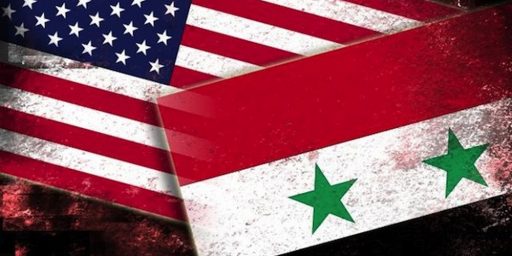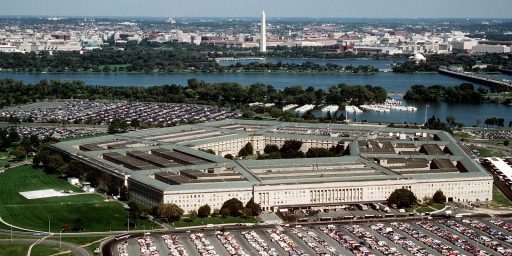MORE NUCULAR STUFF
Kevin Drum has a quote from December 31, 2002 wherein President Bush says:
I think it’s important to remember that Saddam Hussein was close to having a nuclear weapon. We don’t know whether or not he has a nuclear weapon. We do expect him to disarm his weapons of mass destruction, that’s what we expect.
To which Kevin retorts:
Nobody–and I mean nobody–thought that Saddam Hussein had a nuclear weapon at that time. The most hawkish possible analysis from anybody at that time suggested that maybe Saddam could have a nuke by the middle of this decade — if he got his hands on fissile material. And President Bush knew it.
So why was he pretending otherwise?
I’m not sure how we can say this. Obviously, Saddam had the intent to get a nuclear weapons program, had one going at one point in time, and had a ton of money. Our intelligence was obviously highly suspect.
There are a few countries on the cusp that we are in the position of only being able to guess. I’m not sure that we know, definitively, that North Korea has nukes. They claim to have them and we’re taking them at their word, but have we verified it? And it’s even harder on the negative side. My guess is that Israel has nukes, but they’ve never admitted it and I don’t know that we’re sure. Ditto Japan. Ditto Iran.
On December 16, 1998, President Clinton thought Saddam had a dangerous nuclear program, using that as part of the justification for Operation Desert Fox:
Saddam (Hussein) must not be allowed to threaten his neighbors or the world with nuclear arms, poison gas or biological weapons,” Clinton said.
Operation Desert Fox, a strong, sustained series of attacks, will be carried out over several days by U.S. and British forces, Clinton said.
“Earlier today I ordered America’s armed forces to strike military and security targets in Iraq. They are joined by British forces,” Clinton said.
“Their mission is to attack Iraq’s nuclear, chemical and biological weapons programs and its military capacity to threaten its neighbors,” said Clinton.
Clinton also stated that, while other countries also had weapons of mass destruction, Hussein is in a different category because he has used such weapons against his own people and against his neighbors.
Sound familiar?
Timing was important, said the president, because without a strong inspection system in place, Iraq could rebuild its chemical, biological and nuclear programs in a matter of months, not years.
By, say, December 31, 2002?
The Nuclear Control Institute, hardly a right wing mouthpiece, notes the following atop their link-filled page “Saddam and the bomb:”
All of Iraq’s nuclear scientists are still in place. None of the nuclear-bomb components they built before the Gulf War have been found. If Iraq could steal or buy plutonium or bomb-grade uranium, Saddam could have the Bomb in short order.
That page links a December 1, 2002 interview by George Stephanopolus of Dr. Mohamed el- Baradei, the director general of the International Atomic Energy Agency* who, while disputing some previous evidence on Iraqi nuclear weapons–and directly and by name challenging some NCI assertions–notes several times that it was too early to make any conclusions and that he wished for better cooperation from the Iraqis.
Steve Dolley, NCI’s research director, has a letter to the NYT dated November 29, 2002 with the following:
Unfortunately, key technologies like centrifuges to enrich uranium for bombs release little detectable radiation. Fabrication of nonnuclear components for bombs, like high-explosive lenses, emits no radioactivity.
Before 1998, inspectors dismantled much of Iraq’s bomb program. But significant issues remain unresolved:Iraq’s bomb designs and nuclear-weapon components, for example, are still missing.
The greatest risk is Saddam Hussein’s smuggling in bomb material stolen from civil or military programs, which the International Atomic Energy Agency concedes it has very little chance of detecting.
Finally, in a September 30, 2002 press release, they directly challenge IAEA:
Several Iraqi nuclear weapons facilities and much equipment were indeed dismantled or destroyed by U.N. inspectors between 1991 and 1998. However, substantial and significant issues about Iraq̢۪s ability to reconstitute its nuclear weapons program remained unresolved when the inspectors left the country.
Dolley, citing IAEA’s own inspection reports as documentation, said: “Iraq has never surrendered to inspectors its two completed designs for a nuclear bomb, nuclear-bomb components such as explosive lenses and neutron initiators that it is known to have possessed, or almost any documentation of its efforts to enrich uranium to bomb-grade using gas centrifuges, devices which are small and readily concealed from reconnaissance.â€
Moreover, IAEA has previously conceded that Iraq’s weaponization R&D—small-scale technical research devoted to the design of a nuclear bomb’s components—is not readily detected by means of inspections. IAEA Director-General Mohamed ElBaradei stated in 1998 that “no matter how comprehensive the inspection, any country-wide verification process, in Iraq or anywhere else, has a degree of uncertainty that aims to verify the absence of readily concealable objects such as small amounts of nuclear material or weapons components.†(Original has numerous footnotes to hyperlinked supporting docs.)
This past March, Ken Pollack of The Brookings Institution thought Saddam threatening:
In addition to the human rights considerations, of course, Pollack emphasized the strategic rationale for armed intervention — Saddam Hussein’s possession of biological and chemical weapons of mass destruction (WMD), and his ongoing, decades-long quest to develop or acquire nuclear weapons. Pollack considers Saddam Hussein uniquely dangerous among contemporary rulers for his view of nuclear weapons not as a defensive assurance against outside attack, but rather as an offensive enabling factor allowing him to pursue a foreign policy of aggression and conquest.
There are literally dozens of examples I could cite, but I’ve based this little essay on just sources I could find quickly by Googling and that weren’t from sources that had any taint of pro-Republican bias.
*The page is framed so I can’t provide the link to the links themselves, but they’re arranged in reverse chronological order on that page.






Well, all you seem to be saying is that, absent a UN inspection regime, we believed he could reconstitute his weapons program and that would be bad. But there’s one problem, I think, with your logic. We actually had an inspection regime – far more draconian than we had before, I might ad. The quote about the IAEA only goes to postulating a low intensity WMD technology sustainment program. Something that we can’t even find now ourselves. And it appears that the UN inspection team wasn’t lying or being duped as was once claimed. After all, the centrifuge was buried under the roses for 12 years. . .
James, nobody is questioning that Saddam was a dangerous man, and nobody is questioning that our intelligence agencies thought he had a nuclear *program* in place. (Although that appears to have been wrong.)
But that’s not what Bush said, and I don’t think you can just write this stuff off to verbal miscues. This is a subject that he must have been hip deep in, and he stated categorically that maybe Saddam had a bomb. And he must have known that wasn’t true.
He could have said that Saddam was pursuing nuclear weapons, or that he could have one within a couple of years, or anything like that, and he would have been OK. But he didn’t. He had to spice it up, and it’s starting to look like this kind of spicing up was what happened to everything that passed through the White House.
This is important stuff, because it’s going to happen again, and we’re not going to know whether to believe what he says. And that’s just horribly dangerous and horribly corrosive. I really wish conservatives were taking all this a bit more seriously.
Kevin,
Again, I’m not sure how we were to really know that he didn’t have a bomb. We knew/thought he’d been working on one for a decade. There hadn’t been any inspectors in years and President Clinton had said he was within months of getting a bomb as late as Dec. 1998. Why couldn’t he have had a bomb?
Well, this seems like metaphysical nonsense. We also really don’t know if he didn’t have a time machine or the ability to travel faster than light. The question is what is the probability. Is the probability 90% or just merely 1% or .00001%. The problem is, no one knows, as no one is telling. And the info that we are getting is showing that all probability estimates were based on – at best – 5 year old data. The fact that we had inspectors actually in the country with unfettered access before the war actually started pretty much reduced any probability of his possession a nuclear bomb, or even a nuclear program to just barely north of zero. And that’s only because there’s always a trivially small probability that anything can happen, due to quantum mechanics. You seem to keep ignoring the fact that we actually had a serious inspection regime during the time when all these claims were made.
John,
I am not sure what reports you were reading but it was crystal clear that the inspection team had “fetters” every place they turned with as much cooperation from Irag as the Democrats in the Senate give the Republicans in voting on Miguel Estrada. It was a game of hide and go seek with no cooperation and no clues given. The inspection team being present did not change any odds. And the lack of cooperation and refusal to show any documentation of the disposal or destruction of ANY WMD would lead most people to consider the real possibility that they had something to hide, at the very least what we knew they had before.
I don’t recall anyone who thought we had a “serious inspection” going on. Quite the opposite with no information on the disposal of WMD being provided. How can one seriously confirm the disposal of WMD when no information on the disposal is provided? It changes from an inspection to a search, with the people who may have hidden the WMD having years to hide them. Not a serious inspection at all.
Considering the odds and the outcome if we guessed wrong, after 9/11, wisdom and common sense (even in hindsight) would demand we do as we did.